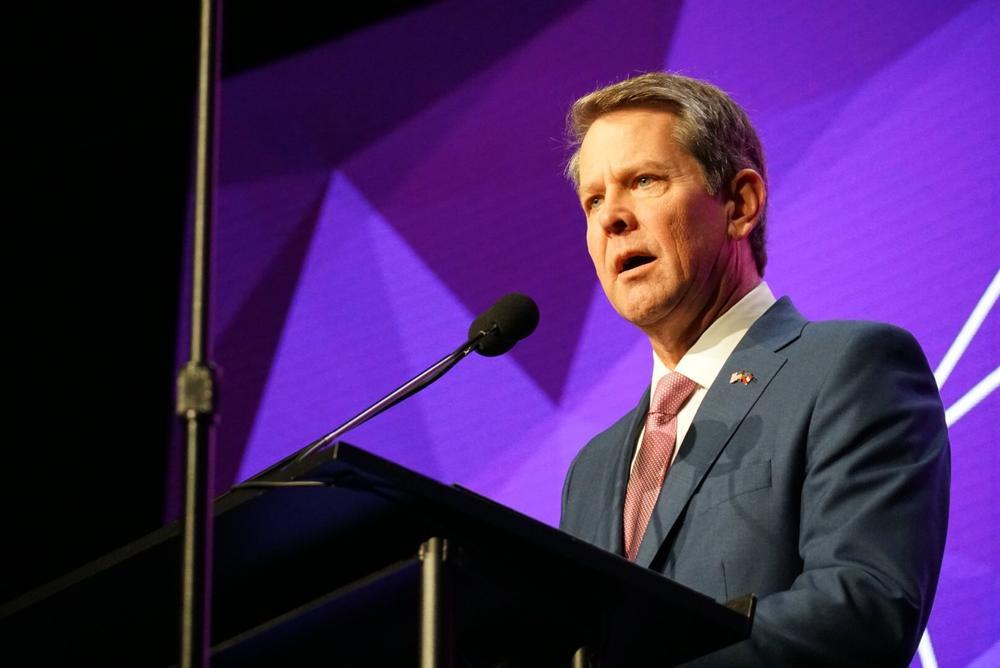
Caption
Gov. Brian Kemp speaks in 2019 at the Eggs and Issues Georgia Chamber event. In 2021, Kemp signed legislation allowing the governor and a few other officeholders to raise unlimited funds toward reelection campaigns.
Credit: GPB
|Updated: May 17, 2021 11:43 AM

Gov. Brian Kemp speaks in 2019 at the Eggs and Issues Georgia Chamber event. In 2021, Kemp signed legislation allowing the governor and a few other officeholders to raise unlimited funds toward reelection campaigns.
Thirty years ago, state lawmakers in Georgia agreed to limit how much money candidates could raise to run for state office.
They also agreed that lawmakers should not accept donations while they are debating and passing legislation — lest they be influenced to pass laws that benefit special interests over what’s best for Georgians.
All of that is about to change for Gov. Brian Kemp and other top leaders. Last week , Kemp signed a bill allowing him and a handful of others to raise an unlimited amount of money starting July 1.
To break down the legislation, GPB’s Rickey Bevington spoke with James Salzer, assistant senior editor for politics and state government at the Atlanta Journal-Constitution.
Rickey Bevington: Bullet point for me what exactly this law does.
James Salzer: This law allows the governor, lieutenant governor, leaders of the [state] House and Senate, the nominee of the minority party and the leadership of the minority party to set up something called a leadership committee. It allows them to raise unlimited amounts of money at any time and spend unlimited amounts of money at any time on their races or get involved in other people's races.
Rickey Bevington: So it sounds like this is a bill that's in preparation for an election year.
James Salzer: Yeah, it was. They actually tried to pass this last year. And in the last end of the session, it stalled. It’s essentially an “Incumbent Protection Act” because it will allow, in this case, Gov. Brian Kemp, Lt. Gov. Geoff Duncan (if he did end up running) and members of the leadership to set up these committees starting July 1 and start collecting unlimited amounts of money from people. Currently, in one election, elected officials can raise about $17,000 to $18,000 per person. That's the maximum they can raise. There's a limit. Legislators can raise $7,000 in an election cycle. This would allow you to raise a million from someone or $100,000 from someone or tens of thousands of dollars from an individual and or corporation or lobbyist or whomever.
Rickey Bevington: James, this bill benefits incumbents. How could that influence who ends up running next year?
James Salzer: For instance, in the governor's race. If you were planning to run against Gov. Kemp or if Lt. Gov. Duncan changed his mind and he said he was going to run for reelection — if you're going to run against those gentlemen, you would have to say, “OK, I'm going to accept the fact that unless I can write my own check, there's almost no way I'm going to be competitive financially in these races” because Gov. Kemp or Lt. Gov. Duncan can set up one of these committees and start raising money right now for that those races.
Rickey Bevington: So it's a long, running head start on fundraising.
James Salzer: Yes. And it particularly will be after next election cycle because, for instance, a governor or lieutenant governor will have four years to raise money.
Rickey Bevington: What are lobbyists saying about this bill?
James Salzer: The ones that I talked to during the session when I was reporting on this didn't like the bill. Before 1990, when lobbyists could donate to legislators during the session, some of the old-timers that I talked to remember it wasn't really a great feeling to feel like you had to — you had three or four bills that you want to get passed or you wanted to kill, and it wasn't a great feeling that you were then supposed to donate to leadership or even the person handling your bills during the session.
Rickey Bevington: So if even lobbyists are uncomfortable with the appearance of the influence over legislation as it's being debated and as it's being voted on, what is the GOP leadership saying defending this bill?
James Salzer: It was a very odd debate to me because it was never, you know, “This is why this is necessary.” It was Sen. Jeff Mullis (R-Chickamauga), the Rules chairman, who sponsored the bill. And all he would talk about was "It's transparent because we will be disclosing where the money is coming from." And one of his arguments was this will be the opposite of “dark money” funds.
Rickey Bevington: Assuming that voters — we're living our lives; we can't pay attention to the details of campaign finance. How will this be policed by the state ethics commission?
James Salzer: The thing about this is it's not set up to be policed. There is a very small number of people — leadership in state government — who can create these committees. And since there is no limit … you're not really breaking any campaign finance laws if there are none. The state ethics commission will take the filings. But I don't know that there is a way to violate this law. I'm sure there is. But off top of my head, it's hard to think of one.